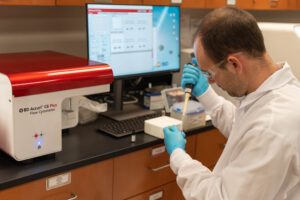
Biohealth Industry Day Highlights Partnerships and Pathways for Early-Career Professionals
While the pandemic has forced many industries to downsize, biotech companies have had the opportunity — or sometimes the obligation — to ramp up. Just take a look at Catalent Pharma Solutions, the Baltimore-based contract manufacturer. The company has hired over 500 new employees since last March, said Talent Acquisition Specialist Charle’ Lamb during a panel at the Biohealth Industry Day.
The event, which was held by Baltimore Collegetown Network online, showcased the changes that some Baltimore-based companies such as Catalent and Next Step Robotics have taken since the pandemic, while also highlighting the different ways students and early-career professionals can get involved in the biotech industry.
And their involvement is very much needed. Catalent currently has over 900 job openings on their website, over 100 of which are biohealth jobs in Maryland.
One way the company is finding new talent is through the Baltimore Collegetown, a network of 13 schools located in or near Baltimore that helps promote the city’s many academic and professional opportunities. Industry Days is one event that allows Baltimore students to hear directly from professionals in their desired fields, and in turn puts companies right in front of students.
Dr. Thomas VanCott, Global Head of Product Development, Cell & Gene Therapy at Catalent, used his keynote to encourage students to think outside the box when it comes to their careers. He said he did not know what CDMOs were when he was in college. As a math and science student, he was often recommended to pursue medical school but found he wasn’t interested.
He went on to graduate school and obtained a P.h.D. in physical chemistry, and was then assigned to a team at Walter Reed that was dedicated to finding a vaccine for HIV (Human Immunodeficiency Virus).
“I was really fortunate to be able to join this group, and it really opened my eyes to this whole field of developing new medicines, developing new vaccines… and how complicated that really can be,” VanCott said. “You’ve got this great idea, but how do you translate that to something that can become a product.”
That question is essential to the work Catalent does, VanCott said. As a contract manufacturer, Catalent is more responsible for making drugs and products a reality than they are for the actual research. VanCott joined Catalent and was able to work on their gene therapy projects, which are aimed at children with diseases such as muscular dystrophy.
“That’s been really incredibly interesting because for me it sort of combines a lot of the best things… it’s a career where there’s a lot of innovation going on, and a lot of the best and brightest minds are looking at new ways to treat some of these diseases,” he said.
Giving students an idea of what jobs are available in the industry is just half of the pipeline battle, though. Actually giving the students a way to connect with companies and begin entry-level work is just as important.
For that reason, Baltimore Collegetown lists internships on their website for both students and employers to access. They also partner with the Maryland Technology Internship Program at UMBC, which works to provide opportunities for Marylanders interested in technology careers. The program provides funding and guidance for technology companies so they are able to offer internships,
The MTIP website is constantly updated with new technology internships available throughout Maryland for the summer, spring and fall semesters.
Brad Hennessy, CEO of Next Step Robotics, said internships were a huge learning experience for him. They’re also a way for students to find out what they like to do, and to provide them with opportunities near their schools.
Keeping talent in Baltimore is also a key factor for talent acquisition. Hennessy, a graduate of the University of Maryland, said starting his company in Baltimore has made a large difference when it comes to working with government agencies and accessing grant money.
“It’s absolutely been critical to our development and our success being in the Baltimore area, with the support systems that are here and an incredible ecosystem that really promotes the health and growth of Baltimore as a biohealth industry leader,” Hennessy said.





